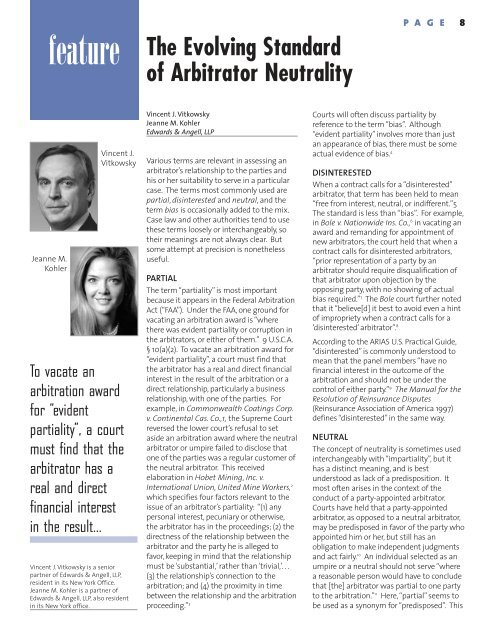FIRST QUARTER 2005 VOLUME 12 NUMBER 1 - arias·us
FIRST QUARTER 2005 VOLUME 12 NUMBER 1 - arias·us
FIRST QUARTER 2005 VOLUME 12 NUMBER 1 - arias·us
- TAGS
- volume
- arias-us.org
Create successful ePaper yourself
Turn your PDF publications into a flip-book with our unique Google optimized e-Paper software.
feature<br />
Jeanne M.<br />
Kohler<br />
Vincent J.<br />
Vitkowsky<br />
To vacate an<br />
arbitration award<br />
for “evident<br />
partiality”, a court<br />
must find that the<br />
arbitrator has a<br />
real and direct<br />
financial interest<br />
in the result…<br />
Vincent J. Vitkowsky is a senior<br />
partner of Edwards & Angell, LLP,<br />
resident in its New York Office.<br />
Jeanne M. Kohler is a partner of<br />
Edwards & Angell, LLP, also resident<br />
in its New York office.<br />
The Evolving Standard<br />
of Arbitrator Neutrality<br />
Vincent J. Vitkowsky<br />
Jeanne M. Kohler<br />
Edwards & Angell, LLP<br />
Various terms are relevant in assessing an<br />
arbitrator’s relationship to the parties and<br />
his or her suitability to serve in a particular<br />
case. The terms most commonly used are<br />
partial, disinterested and neutral, and the<br />
term bias is occasionally added to the mix.<br />
Case law and other authorities tend to use<br />
these terms loosely or interchangeably, so<br />
their meanings are not always clear. But<br />
some attempt at precision is nonetheless<br />
useful.<br />
PARTIAL<br />
The term “partiality” is most important<br />
because it appears in the Federal Arbitration<br />
Act (“FAA”). Under the FAA, one ground for<br />
vacating an arbitration award is “where<br />
there was evident partiality or corruption in<br />
the arbitrators, or either of them.” 9 U.S.C.A.<br />
§ 10(a)(2). To vacate an arbitration award for<br />
“evident partiality”, a court must find that<br />
the arbitrator has a real and direct financial<br />
interest in the result of the arbitration or a<br />
direct relationship, particularly a business<br />
relationship, with one of the parties. For<br />
example, in Commonwealth Coatings Corp.<br />
v. Continental Cas. Co.,1, the Supreme Court<br />
reversed the lower court’s refusal to set<br />
aside an arbitration award where the neutral<br />
arbitrator or umpire failed to disclose that<br />
one of the parties was a regular customer of<br />
the neutral arbitrator. This received<br />
elaboration in Hobet Mining, Inc. v.<br />
International Union, United Mine Workers, 2<br />
which specifies four factors relevant to the<br />
issue of an arbitrator’s partiality: “(1) any<br />
personal interest, pecuniary or otherwise,<br />
the arbitrator has in the proceedings; (2) the<br />
directness of the relationship between the<br />
arbitrator and the party he is alleged to<br />
favor, keeping in mind that the relationship<br />
must be ‘substantial,’ rather than ‘trivial,’. . .<br />
(3) the relationship’s connection to the<br />
arbitration; and (4) the proximity in time<br />
between the relationship and the arbitration<br />
proceeding.” 3<br />
P A G E 8<br />
Courts will often discuss partiality by<br />
reference to the term “bias”. Although<br />
“evident partiality” involves more than just<br />
an appearance of bias, there must be some<br />
actual evidence of bias. 4<br />
DISINTERESTED<br />
When a contract calls for a “disinterested”<br />
arbitrator, that term has been held to mean<br />
“free from interest, neutral, or indifferent.”5<br />
The standard is less than “bias”. For example,<br />
in Bole v. Nationwide Ins. Co., 6 in vacating an<br />
award and remanding for appointment of<br />
new arbitrators, the court held that when a<br />
contract calls for disinterested arbitrators,<br />
“prior representation of a party by an<br />
arbitrator should require disqualification of<br />
that arbitrator upon objection by the<br />
opposing party, with no showing of actual<br />
bias required.” 7 The Bole court further noted<br />
that it “believe[d] it best to avoid even a hint<br />
of impropriety when a contract calls for a<br />
‘disinterested’ arbitrator”. 8<br />
According to the ARIAS U.S. Practical Guide,<br />
“disinterested” is commonly understood to<br />
mean that the panel members “have no<br />
financial interest in the outcome of the<br />
arbitration and should not be under the<br />
control of either party.” 9 The Manual for the<br />
Resolution of Reinsurance Disputes<br />
(Reinsurance Association of America 1997)<br />
defines “disinterested” in the same way.<br />
NEUTRAL<br />
The concept of neutrality is sometimes used<br />
interchangeably with “impartiality”, but it<br />
has a distinct meaning, and is best<br />
understood as lack of a predisposition. It<br />
most often arises in the context of the<br />
conduct of a party-appointed arbitrator.<br />
Courts have held that a party-appointed<br />
arbitrator, as opposed to a neutral arbitrator,<br />
may be predisposed in favor of the party who<br />
appointed him or her, but still has an<br />
obligation to make independent judgments<br />
and act fairly. 10 An individual selected as an<br />
umpire or a neutral should not serve “where<br />
a reasonable person would have to conclude<br />
that [the] arbitrator was partial to one party<br />
to the arbitration.” 11 Here,“partial” seems to<br />
be used as a synonym for “predisposed”. This


